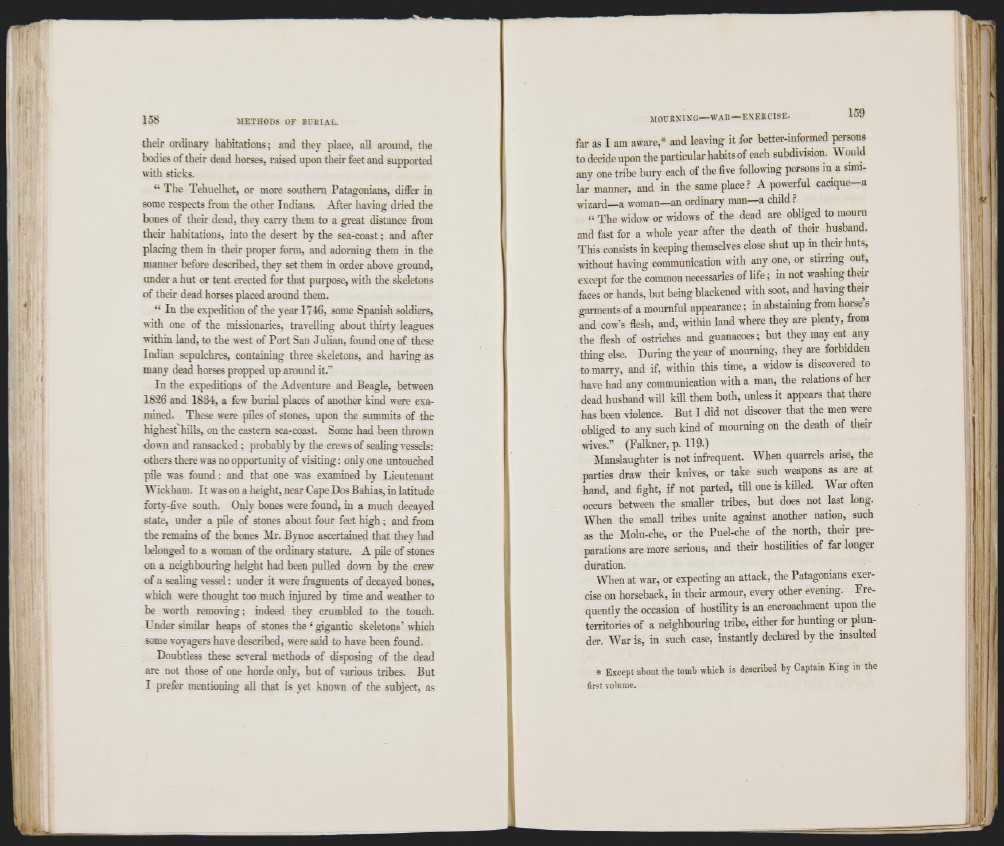
their ordinary habitations; and thej' place, all around, the
bodies of their dead horses, Rjised upon theft feet and supported
with sticks.
“ The Teliuelhet, or more southern Patagonians, differ in
some respects from the other Indians. After having dried tlie
bones of their dead, they carry them to a great distance from
tlieir habitations, into the desert by the sea-coast; and after
placing them in theft proper form, and adorning them in the
manner before described, thev set them in order above ground,
under a hut or tent erected for that purpose, with the skeletons
of theft dead horses placed around them.
“ In the expedition of the year 1746, some Spanish soldiers,
with one of the missionaries, travelling about thirty leagues
witlun land, to the west of Port San Julian, found one of these
Indian sepulchres, containing three skeletons, and having as
many dead horses propped up around it.”
In the exjieditions of the Adventure and Beagle, between
18.26 and 1834, a few burial places of another kind were examined.
These were piles of stones, upon the summits of the
highest hills, on the eastern sea-coast. Some had been thrown
down and ransacked ; probably by the crews of sealing vessels:
others there was no opportunity of visiting: only one untouched
pile was found: and that one was examined by Lieutenant
Wickham. I t was on a height, near Cape Dos Bahias, in latitude
forty-five south. Only bones were found, in a much decayed
state, under a pile of stones about four feet liigh ; aud from
the remains of the bones Mr. Bynoe ascertained that they had
belonged to a woman of the ordinary stature. A pile of stones
on a neighbouring height had been pulled down by the crew
of a sealing vessel: under it were fragments of decayed bones,
which were thought too much injured by time and weather to
be worth removing; indeed they crumbled to the touch.
Under similar heaps of stones the ‘ gigantic skeletons’ which
some voyagers have described, were said to have been found.
Doubtless these several methods of disposing of the dead
are not those of one horde only, but of various tribes. But
I prefer mentioning all that is yet known of the subject, as
far as I am awai-e,* aud leaving it for better-informed peraons
to decide upon the particular hahits of each subdivision. Would
any one tribe bury each of the five following persons m a similar'
manner, and in the same place.? A powerful cacique-a
wizard—a woman—an ordmary man—a child ?
“ The iridow or widows of the dead are obhged to mourn
and fast for a whole year after the death of theft husband.
This consists in keeping themselves close shut up in their huts,
without having communication with any one, or stirring out,
except for the common necessaries of life ; in not washing their
faces or hands, but being blackened with soot, and having their
ganuents of a mournful appeai-ance ; in abstaining from horse s
and cow’s flesh, and, witlflu land where they are plenty, from
the flesh of ostriches and guanacoes ; but they may eat any
thing else. During the year of mourning, they ai-e forbidden
to marry, and if, within this time, a widow is discovered to
have had any communication with a man, tbe relations of her
dead husband wiU kül them both, unless it appeai-s that thei-e
has been violence. But I did not discover that the men were
obliged to any such kind of momniing on the death of their
wives.” (Falkner, p. 119.)
Manslaughter is not infrequent. When quarrels anse, the
parties draw theft knives, or take such weapons as are at
hand, and fight, if not parted, tül one is killed. War often
occurs between the smaller tribes, hut does not last long.
When the small tribes unite against another nation, such
as tlie jilolu-che, or the Puel-che of the north, their preparations
are more serious, and theft hostilities of far longer
duration.
When at war, or expecting an attack, the Patagonians exercise
on horseback, in their armour, every other evening. Frequently
the occasion of hostility is an encroachment upon the
territories of a neighbouring tribe, either for hunting or plunder.
War is, in such case, instantly declared by the insulted
* Except about the tomb which is described hy Captain King in the
first volume.